How Gwenpool Knows the Unknowable (And Can We Do the Same?)

When someone “transcends” something, they seem to understand that thing on a heightened level, and come to view it as something distinct from themselves. You couldn’t transcend time and space, for example, while simultaneously existing within time and space – after all, in order to get the heightened understanding that comes with transcendence, you’d have to be outside time and space. In other words, understanding something objectively, from without, is inextricably tied to transcendence, for transcendence is characterized by a distanced position in relation to that which has been transcended. If the transcendent state allows one to understand time and space from an objective stance, then transcendence must situate one on a plane that is altogether distinct from time and space.
Makes sense? Good. Now that that’s all cleared up, let’s talk comics. In this piece, I’ll explore how The Marvel character “Gwenpool” transcends the reality of the Marvel Universe (i.e., its time, space, and materiality) by removing herself from it – and then I’ll discuss how (or if) we are able to the same.
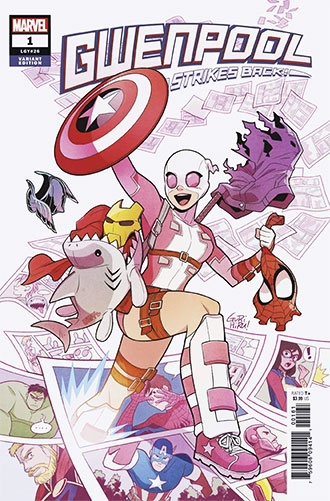
Gwenpool understands the Marvel Universe (MU) on a deeply meta level. Specifically, she understands that the MU is a narrative that is beyond or apart from herself, and thus she is able to look reflexively at it, from an objective position. As a self-proclaimed “subversive, self aware commentary on cape-comics” 1 (who knows she lives within the confines of said comics), Gwenpool is able to remove herself from the pages that constitute her reality: she navigates her way through gutter space (the space between panels), jumps forward and backward through time, and acts against the authority of her authors. Her ability to transcend the MU’s time, space, and authorship is contingent on her knowledge of the MU, knowledge she attained as a Marvel fan in our “real” world. Gwendolyn Poole was, at one point, a resident of “our” universe; however, after becoming transported into the MU, she finds herself faced with the challenge of surviving in a world she knows to exist within a comic book. As a fan of the genre, she knows that “extras” – anyone who is not a costumed hero or villain – is nonexistent as a character. They occupy the background of a panel here and there, but because they have no story lines, they do not exist beyond these inconsequential appearances. Therefore, in order to stake a place for herself within the MU, to survive and exist within a world of fiction, she must don a costume and adopt a moniker befit for a “major” player in the MU with her own series: “Gwenpool.”
Using the narrative and concrete rules of the comic book world to her advantage, Gwenpool becomes what is essentially an omniscient character – her objective knowledge of the MU effectively translates to her transcendence of the MU. But how is this knowledge attained and/or constructed? In order to transcend reality, one must appreciate the universe as an enclosed system of time, space, matter, and energy that can be observed from without, as one might observe a text. To what extent is this possible for us, here in the “real” word? How can we separate ourselves from the reality in which we exist, as Gwenpool does with the MU? Is there a space outside ourselves or outside reality from which we can observe the universe objectively?
Historical Understandings of Transcendence
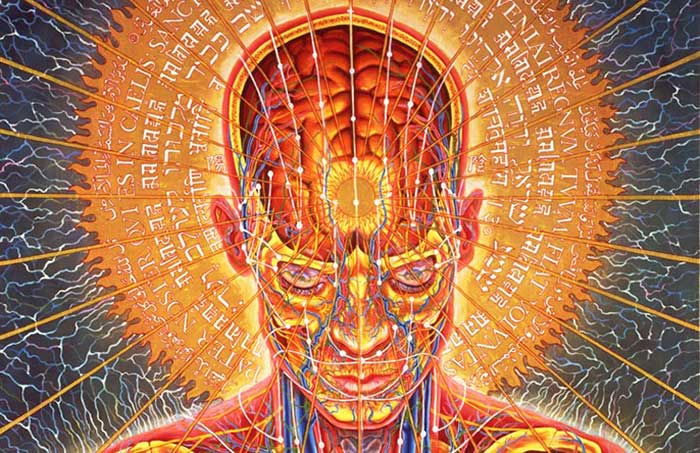
Behind the discussions that circulate philosophical, rhetorical, and literary discourses, lurking in the background, are the ever-present issues of “what is reality? Is it constructed internally or does it exist objectively/externally? If external, how can we access ‘reality’ (or ‘truth’) and subsequently articulate/describe it?” Either consciously or unconsciously, these debates surrounding the nature of “reality” engage with the issue of the human condition – i.e., how our subjectivity, or sense of self, determines our experience of the world, and how we understand that which exists beyond our capabilities of perception. Transcendence composes the fabric of these discussions because at their heart lies the issue of human capability, the question of what defines the human subject’s relationship with the universe. Implicit in trying to understand and articulate what reality is, and how it is perceived/constructed within the human subject, is the question of what the limits of the human condition are, and if/how they can be transcended. Can we perceive truth or reality in such a way that supersedes our natural (i.e., biologically determined) capability? What is the extent of our capabilities in the first place?
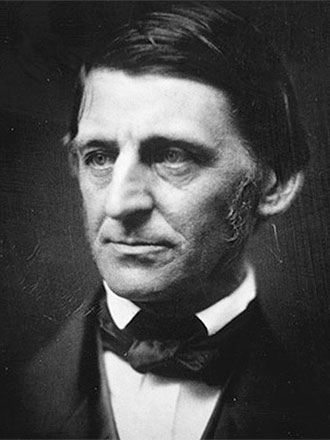
In 1842, American writer Ralph Waldo Emerson published “The Transcendentalist,” a lecture that aligned transcendence with idealism. Framing his lecture within the antimony between materialists and idealists, Emerson argues that the question of transcendence is a question of viewpoint: idealists, unlike materialists, do not understand the world in terms of the sensory information humans can interpret, but rather appreciate that the material world as we empirically experience it is mediated by processes of sensory perception. In Emerson’s antimony between the idealist from the materialist, the former is treated as a superior perceiver of reality because they appreciate it as something beyond what it appears to be. This level of perception is contingent on the idealist subject becoming distanced from their material world, to the point that they perceive said material world from a position that is not entrenched within it.
Abraham Maslow (writing in 1971) adopts a similar rhetorical strategy when enumerating the various meanings of transcendence, such as that of ego, time, culture, etc. 2 To Maslow, the premise of transcendence involves a deviation from our “typical” or subjective understandings of these constructs. That is, the transcendent state enables the subject to perceive that which has been transcended from an alternative viewpoint, a viewpoint from which some aspect of life that is typically perceived in a limited capacity becomes appreciated in terms of new meaning and from alternative perspectives. When Maslow describes transcending time, he describes seeing the tradition of academia “stretched way, way out into the future… [and] stretching out behind [him] into a dim, hazy infinity” (56); and thus in this transcendent experience, time stands “outside [his] own skin” (57). In this way, Maslow rhetorically lifts his subjective self from its place among the flow of time, transcending his individual moment in this temporal flow and appreciating it in its totality.
Emerson and Maslow engage the concept of transcendence at the nexus of what it means to understand things from a perspective that is distinct from the typical understandings of these things. They treat transcendence as an alternative position of rhetorical subjectivity: the transcendent subject is able to regard that which they have transcended from a position that is more etic than emic – or in other words, a position from which time, the senses, or the self can be perceived from outside the confines of time, sensory perception, or the self.
Gwenpool’s Brand of Transcendence
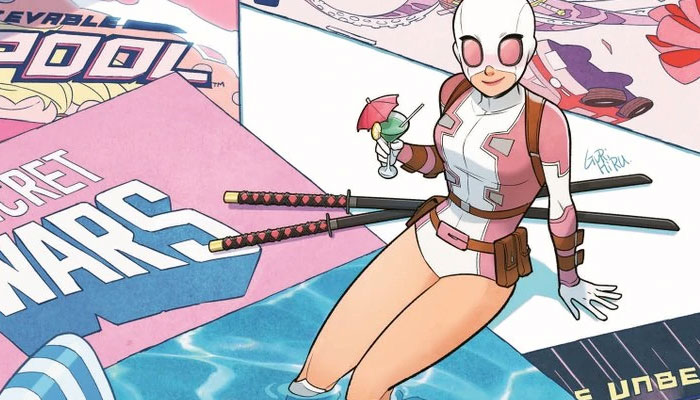
Gwenpool takes the concept of “removed subjectivity” or “objective subjectivity” and translates it to a level of meta-cognition. She does not take reality at face value – like Emerson, she “perceives that the senses are not final,” 3 – and thus she is able to externalize time and space into constructs that exist outside herself. Gwenpool is not confined to a “normal” perception of time and space because she can separate her subjectivity from these constructs and appreciate objectively how they function as narrative tools in the MU. She understands that the MU is the product of writers and artists, printed in comic books, and because she knows this, she transcends the spatial and temporal rules of the medium. Jumping out of panels, into gutter space, and between pages enables her to navigate both space and time in the MU with an omniscient level of agency. Gwenpool’s brand of transcendence, therefore, entails a complete separation of her own subjectivity from the universe in which she operates.
As important as what type of transcendence Gwenpool achieves, however, is how she is able to so. The methods of transcendence that are most pertinent to this discussion concern knowledge construction. Knowledge shapes reality, and therefore the ways in which knowledge is constructed determine the ways in which reality is perceived. In The Handbook of Science and Technology Studies, writers Chris Salter et al. examine the ways in which creativity, improvisation, and aesthetics function as “crucial epistemic tools,” arguing that purely scientific discourse cannot fully articulate the construction of knowledge. Like Emerson, they engage the issue of how empirical data is always mediated, contextualized, and framed within the human realm of thought, emotion, and narrative.
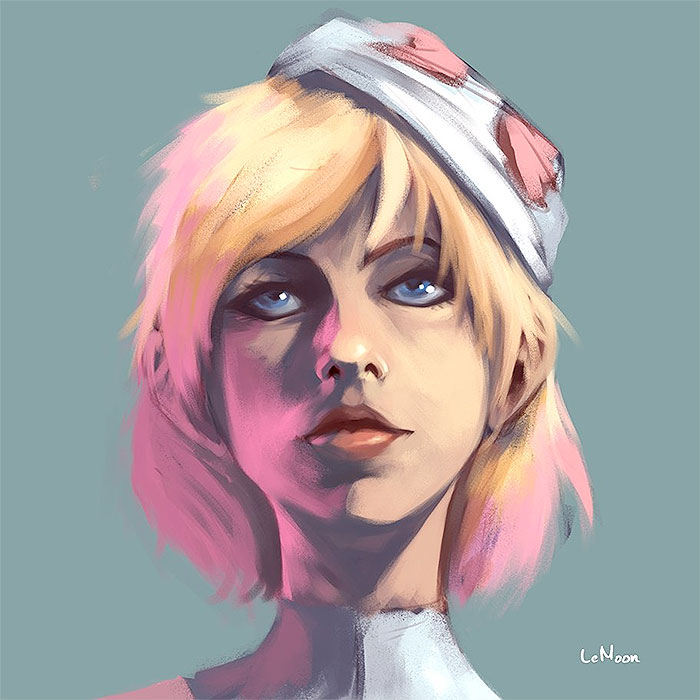
When Gwenpool finds herself trapped within a series of Marvel comics, she does not accept it as her reality at face value as the other inhabitants of the MU do (with the exception of Deadpool). Rather, she uses her knowledge of the fact that she exists within a narrative to separate herself from that narrative (which Deadpool cannot do). That is, she is aware of the comic books that contain and comprise her reality, and is consequently able to “see” them from a meta-position of God-like omniscience. Gwen’s form of transcendence, understood as a separation or detachment from the world in which she resides, is afforded by her knowledge of said world. But her knowledge of the MU is not constructed through scientific inquiry: she doesn’t observe, measure or interpret the empirical data of the MU, because she knows this information is inconsequential compared to the knowledge of who or what it is that makes and controls the MU. In other words, rather than try and understand what she sees, she seeks to understand why it is that she sees what she does. Gwen’s knowledge of the MU is constructed by narrative means, by stepping outside her reality to read it as a story – a material collection of comics that are written and drawn into existence by external agents. As one who once held the same position of externality, she shares the same knowledge of the MU as do its creators.
Because Gwenpool knows how the world of comic book fiction operates, she is able to “hack” its material and narrative structure. Time operates through space within the pages of a comic book, with future lying in pages to come and the past residing in pages prior. At one point in her story, Gwenpool encounters her future self, who tells her,“You’ve read the comics, and that means you know the whole story.” 4 Like all narratives, her plot – her world – advances with each turn of the page; and, appreciating this fact, Gwen traverses the temporal structure of MU as one might flip through the pages of a book. The fact that she appreciates her reality in terms of its narrative structure means that she is able to position her subjectivity outside this structure. That is, when she “steps out” of the panels, per se, and views the entirety of the MU as a spanning arc of pages past and pages to come, she occupies a viewpoint outside of space and time. In her “gutter-space world,” Gwen is completely removed from the fabric of the MU on every dimensional level – and it is this distinction of her subjectivity from her reality that allows the former to transcend the latter.
What Agency Does Transcendence Afford?
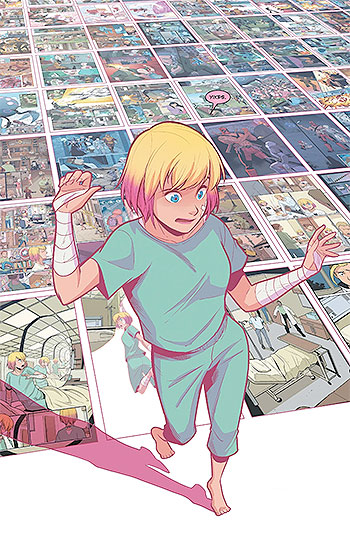
Gwenpool’s significance as a character and as a concept lies not only in the fact that she is aware of the narrative rules of the MU, but also that she uses this awareness to reshape her reality. Her view of the “cosmology” of the MU (i.e., its ontological rules a work of narrative fiction) would be insignificant if it did not result in a radical shift of her agency within that universe. In addition manipulating time and space, Gwen is able to engage her writers and artists directly in a battle for control over her destiny. She can come face to face with her creators – her writers, editors, and artists. For instance, in issue 20, Gwenpool faces a future version of herself that has become a major villain in the MU.She confronts this version of herself in the gutter space, wherein they both regard the spanning road of comics that contain their future. As they contemplate this spatio-temporal vista, the following dialogue takes place:
EVIL GWEN: If you keep going against what this universe wants for you, it’s going to give up, and it’s going to discard you… If you want to survive, then you play the villain. And look. You get to do it for a long time.
CURRENT GWEN: That’s my future?! That road of comics? … I will never do anything you did on those future pages. Do you understand? They will not happen.
(Hastings, The Unbelievable Gwenpool, iss. 20)
In the next volume, when Gwen faces cancellation – because her series is not renewed – a wiser, future version of herself (not to be confused with the evil version of herself from the previous volume) descends through the gutter spaces of her final issue to offer words of comfort:
YOUNG GWEN: Someone is writing this, controlling it!
FUTURE GWEN: Not quite. Gwen, you were supposed to be a joke. Sell some comics, have a laugh and then be forgotten. But you hung around, and… people started to realize you and your powers were actually kind of a dangerous concept. You should be a villain. But you kept having a life of your own. You’re more in control then you realize … When you refused to turn [evil], you knew you were giving up your future. And you knew it in a real and concrete way that other heroes never get the opportunity to. You came here with the belief that none of the people here mattered because they weren’t real, and you’ve come all the way to giving up everything not to hurt them. You did become a hero, Gwen.
(Hastings, The Unbelievable Gwenpool, iss. 25).
The fact that Gwen can separate herself from her reality allows her to navigate spacetime in the MU on an omniscient plane, and this position puts her in dialogue with the shapers of her destiny. That is, because she can see her future in the form of the pages of Gwenpool comics yet to come, she is able to question her destiny, and even act against it.
Be it through her ability to navigate time and space in the MU through “page hacks,” or her ability to speak against the authorial agency of her writers, Gwenpool explores the implications, consequences, affordances of transcending reality. In this way, she demonstrates the fact that “a cosmological shift is not just about knowing more, or knowing differently. It’s composed of a set of factors that… hold within it consequences that intersect with a larger tapestry of thought and life” (Reed, n. pag.). The acquisition of new knowledge not only reframes her understanding of her world, but also changes the agency she has over that world. Her transcendent perception of the MU affects her actions, her destiny, and ultimately her identity.
What Can We Learn From Gwenpool?
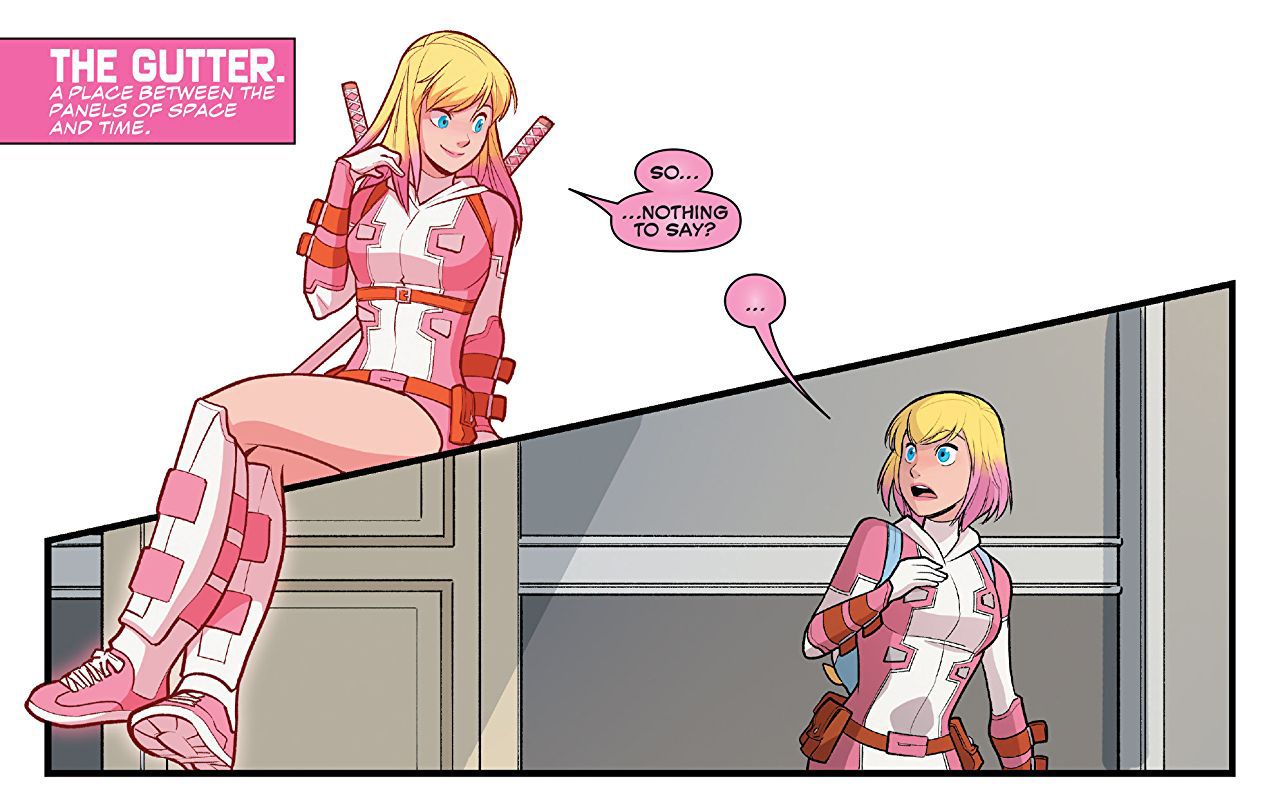
Many discussants of transcendence such as Emerson and Maslow suggest that the removal of one’s own subjectivity from his or her reality can be done only as a thought experiment. In contrast, Gwen does this literally: she is able to physically transcend fabric of the MU and actually see both her comic world and her place within that world from a removed position. Shifting her position of subjectivity within the MU to an objective view of the MU, she is able to understand its structures and thereby exploit them for her benefit, and take control of the direction her arc takes.
But now it is now time to ask whether or not there is any way we, in the “real” world, can observe, navigate, or defy the universe in the same way as Gwenpool observes, navigates, and defies hers. For those of us in this “real” world, our position of subjectivity is trapped within the reality in which it resides: we cannot regard our universe from a position outside the universe. After all, from where would one observe the universe in such an objective manner as Gwen observes hers? Is there a space outside space itself in which a subject might observe said space? For Gwen, it is the gutters of comics that provide such a “space outside space.” The “gutter world” is a realm outside the narrative stream of the MU, and is entirely distinct from this narrative’s spatio-temporal rules.
In our case, while it is theoretically possible to see the future or past through time dilation or relativity, and see/travel to other locations in space via wormholes, 5 these manipulations of time and space are not the same as Gwen’s, for she does not apply any scientific method to her world-bending methods. She is able to accomplish the feats she does because she understands her universe to a heightened degree, by engaging with it as a narrative rather than an assortment of measurable phenomena or sensory stimuli. The key to her manipulation of the materiality of her world is seeing it from her unique, outsider perspective. Her only “power” is that she knows she is in a comic book, in a story – but this knowledge is what affords her the opportunity to see her universe for what it is: a series of glossy pages with ink on them.
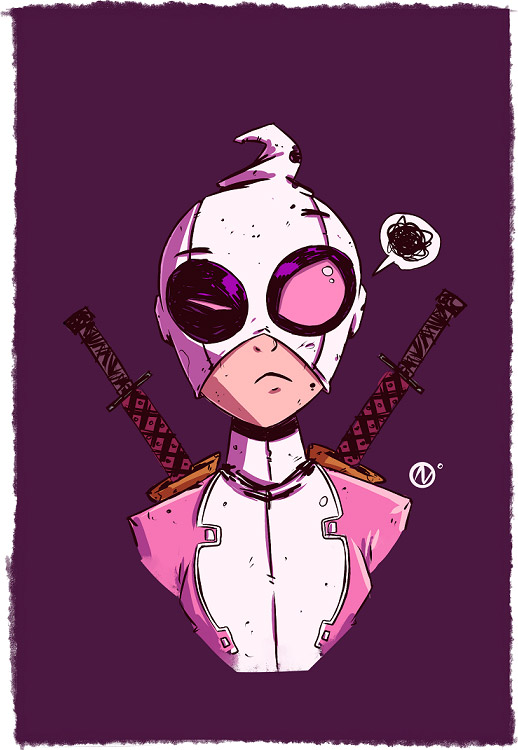
For Gwenpool, deriving “ultimate knowing” from a literary or storytelling framework – as opposed to a scientific one – is sufficient for attaining omniscient knowledge, for the “meaning” of the MU is based in the rules of storytelling. As literary critic David Herzberger states, “literature (storytelling) allows human beings to explore the essences of the world, but with the understanding that these essences are always transformed through the creation of new stories told from new perspectives” (n. pag.). Our understanding of the nature and meaning of the universe is represented through literary themes, archetypes, and symbols: elements of a greater narrative – or series of narratives – that is wont to change constantly given shifts in culture or science. All lines of inquiry concerning the nature of knowing and being (and the answers to which they lead) therefore fit into the premise of storytelling, for they are contextualized within the greater “narrative” of existence, a narrative we construct so as to better understand the universe as more than the sum of its parts, or more than what it appears to be at any given time to any given being. Gwenpool’s ability to recognize the MU as a narrative demonstrates “the capacity of stories to view the world from above and provide it with depth” (Herzberger, n.pag.). Here, “from above” is the crucial phrase: both Herzberger and I link the concept of detached subjectivity to a narrative-based perception of reality.
What can be taken from this is that knowledge (in the sense of what we know about the world), does not shape reality to same extent as does the way we see the world. I am not proposing that we should aspire to perceive our entire cosmos as a comic book; I am merely arguing that Gwenpool illustrates the fact that, given the right perspective, our subjectivity can be pushed as close as is possible to the asymptote of objectivity. If we understand the universe as a narrative that we can hold in our hands, as Gwenpool once held Marvel comic books in her hands, we can imagine ourselves as reading it as a text. We can look forward and back across time and space by analyzing patterns that manifest themselves over massive temporal scales.
Gwenpool’s meta nature highlights “the important difference between merely knowing and existing in what is known; an ‘existing in’ that entails working out how one navigates the world” (Reed, n.pag.). As we unravel more and more mysteries of the universe every day, we are faced with the philosophical task of understanding the implications of our discoveries – of deriving meaning from understanding. Gwenpool can help us with this task. For example, while she knows that she lives as a comic book character, she does not simply accept this fact: she explores how she can use this knowledge to navigate the MU, reclaim agency, and ensure her continuity.
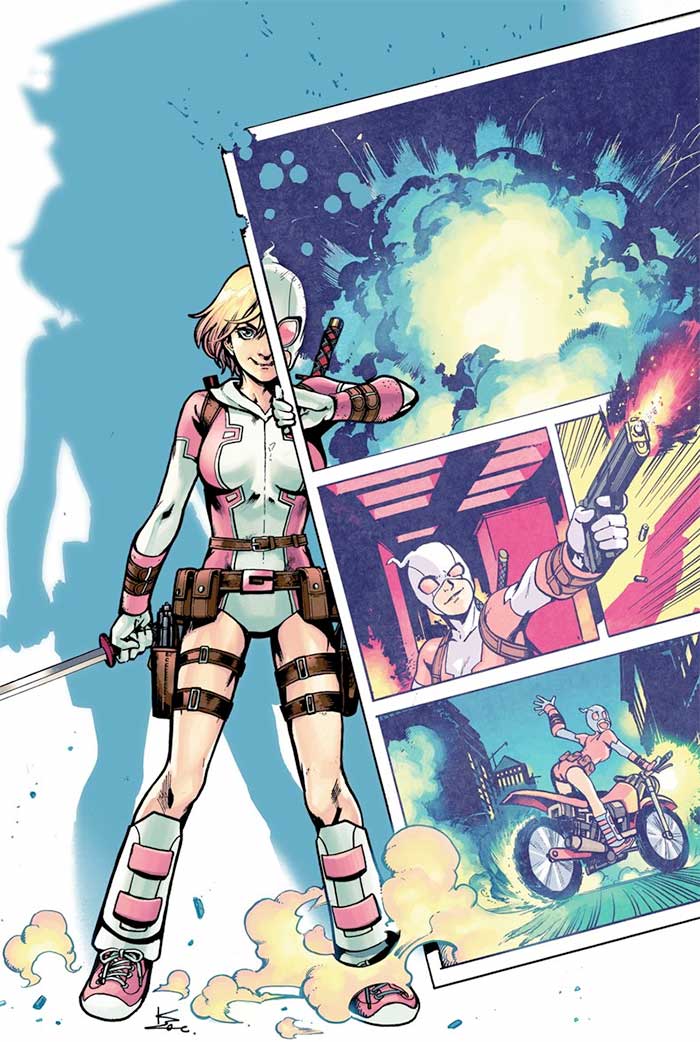
As we discover more fundamental facts about our universe (such as pinpointing its exact time of origin 6), we must ask ourselves how we can use this knowledge to take a certain level of agency over the external world, or at least appreciate it in a more total or holistic way. For instance, as scientists hone in on the universe’s origins, unravel its composition, and identify its guiding forces, 7 we construct a narrative of existence, a narrative into which we must situate ourselves. Our knowledge of the universe contributes to an increasingly objective position relative to said universe, for increasingly “deep” understandings of the universe’s fabric and origins increases the scope of our viewpoint. With the awareness we are constructing everyday, we delimit our subjective position from our single moment in spacetime and begin to achieve a perspective that spans over all existence, from beginning to end.
Recall what Gwen’s future self says to her current self when the two come into conflict over the nature of her role in the MU (vis-à-vis hero or villain): “You’ve read the comics, and that means you know the whole story” (Hastings, The Unbelievable Gwenpool, no. 20). If we wish to understand the “whole story” of our universe, we must find a way to read the pages of this story, so to speak. Narrativizing our reality is one method by which we could attain such a distanced, objective look at our possible futures, and choose to act in such a way that will bring us to the one most desirable. More generally, such a narrativized view of reality affords the chance to imagine how the universe and all its time, space, matter, and energy will manifest themselves in the pages of existence that we are yet to experience.
Works Cited
- From Gwenpool Strikes Back, iss. 1 ↩
- From “The Various Meanings of Transcendence” ↩
- From The Transcendentalist, pg. 164 ↩
- From The Unbelievable Gwenpool, iss. 20.(NB: all quotations from Gwenpool retain original italics) ↩
- NB: I am by no means a theoretical physicist ↩
- See Evan Gough’s ScienceAlert.com article, “Astronomers Are Closing in on the Precise Moment The Universe Lit Up” (2019) ↩
- See Phoebe Southworth’s The Telegraph article, “Have Scientists Discovered a Fifth Force of Nature?” (2019) ↩
What do you think? Leave a comment.
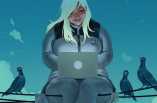
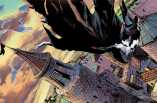

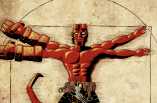
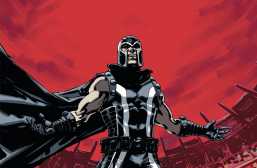
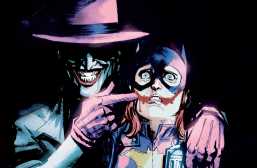
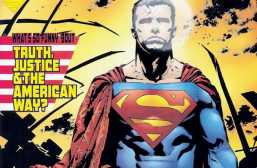
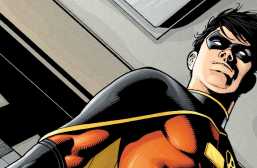
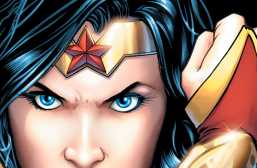
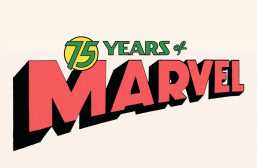
When I first heard the name Gwenpool I thought it’s just female Deadpool but this is awesome it’s totally different.
It’s actually hard to imagine what gwens life must be.
She’s written to be from the real world but isn’t, and constantly has to deal with the reaction she gets from people of the real world.
Not only that but each time someone different uses her character it’s just another version of her she has to be and has to follow the story or else everything just stops.
She has to constantly be entertaining because the other characters actually live in that world but she only live in the comic panels when the issue is over all she can do is wait to show up in another.
One of several characters that are worth suffering inconsistent writing for.
Sony Animation needs to make an animated film for Gwenpool in the spider-verse animation style.
I like how even when she’s addressing the readers she doesn’t look beyond the fourth wall except for when it happens that the establishing shot was facing her since she can’t actually see it and just knows that whatever she says here will be read by the readers. I don’t, however like that the real world was retconned. It could’ve just been another Marvel alternate universe exactly identical to the real one except for the added detail of Gwen and her lineage existing.
The “real” world was never retconned. If you mean when her brother dragged her into her old life and that turned out to be a façade, it wasn’t saying her real life had always been fake, it meant she couldn’t return to the real world because by it’s very nature of being real, it couldn’t appear in a comic. If anything that world being shown to be a farce just further justifies that gwen comes from the “real” world
I really like that gwenpool is just insane. The idea that her reality warping went so out of control that she started to loose her mind is really interesting and she’s a mutant now so she’s part of marvels best comic series.
I really wasn’t a fan of the mutant outcome because it doesn’t make sense to me personally. But otherwise, I didn’t hate it and it’s a part of my collection. I have many grievances, but I didn’t hate it.
So I really wanna read this now but I feel like I need more prior knowledge of Deadpool before I can read her since she is a spin off of him…
To say Gwenpool is a spinoff of Deadpool is not quite accurate. More like ‘inspired from’. I pretty much never read any super hero comics, but got into Gwenpool because I’m a big fan of the creator, Chris Hastings. I never felt lost due to my lack of Marvel knowledge. You can totally dive into Gwenpool anytime!
You absolutely do not.
Gwenpool is nothing like Deadpool. She is a girl trying to feel and survive. She has grown up too which is nice.
I actually found gwenpool and I thought it was a gwen copy of deadpool, like a blatant copy and deadpool is one of my favourites and as I began to read the comics more and all I could really say was wow because I was brought in for one reason and stayed for another, and the way this one ended was amazing to me.
Gwen pool might be from the marvel version of earth prime, the dc universe that is more realistic.
My take is that any of these marvel characters could bend reality like gwenpool. Her actual power is being able to see all the comic stuff, and the only reason no one else bends reality like her is just because they never knew they could.
Wait a sec, if she is not from the “real world” or Marvel’s alt-reality of it, then why did Dr. Strange confirm it in her first comic run? As far as the ending for Strikes Back, Gwen actively dismissed what Kamala said and agreed to it to stay relevant. Gwen is a reality warper she may have retconned herself to be a mutant. She did have a great showing in X of Swords tho.
When I first knew about her, I thought she was going out to be one of those Gwen Stacy’s clones that one guy gave to Deadpool to get him out of his back, that she had broke free and had started her own career, or something of the sort. So I was surprised to find out which her real story is, and I was glad. However, she could had been handled better. Honestly, through the whole Hastings arch, I felt like they were just taking shots in the dark. The general idea of a comic’s fan getting “isekai-ed”, and figuring out that her best chance to survive would be to become a popular character, it’s not a bad idea, but they seriously missed the point and got out of track dramatically.
This is interesting – I first came across her from Lego Marvel Superheroes 2.
Back then when I read her comic in the library, I liked how clean the comic art style and presentation, maybe it’s the gurihiru art style that brings out the anime manga /western comic blend of mix, there isn’t that many textbox with that many illaboration, funny and I like how she is basically a representation of how will a marvel reader or fan getting into the comic book world be like (also mix in some isekai element in it) then the art style also make her and other character pretty expressive.
I feel like maybe someday she can deserve more popularity by feature in an animated film kinda like spiderverse or maybe her own anime series (she’s quite popular in Japan too perhaps thanks to the artist)… since back then we had x men and marvel disc war series so I think it will work quite well as long as she can be portrayed just as expressive as her comic book counter part and given the same amount of lore, back story and struggle she have in both the real world and the marvel world.
I’m a big fan of Gurihiru Studios. I would LOVE to see an animated Gwenpool feature too!
She’s really not that important and she actually doesn’t have much of an effect on the Marvel universe. The only things she can change are about herself and how things relate to her. She’s not considered so important at Marvel comics(the real company) that this character is responsible for important retcons to the setting.
Her comic runs are fun to read especially in trade, you can just have a fun time reading a character than can do whatever the hell she wants to do.
This is a character I want to see in THE MCU and with all of the reality disturbing that had been happening within it, there’s no better time to do so.
Gwenpool Vs Squirrel Girl will be the battle of the ages.
She looks like an anime character in newer version she is definitely marvel version of isekai character.
Gwenpool is the best isekai comic book character ever I can’t wait to see how she Handel’s know the Knull the god of the Symbiotes.
Now I myself have imagined two new types of alternate versions of GWEN-POOL; The first I can imagine is a version of (GwenPool) who is the last descendant of MERLIN, and so I imagine that she has allot of untapped powerful magic, along with allot of potential that is unknown to her, and to add I can imagine that this version of GWEN is a only child, and yet despite that she does have two cousins whose names are Bradley & Annie Hill.
The 2nd. alternate version of (GWEN-POOL) I imagine is about one who was secretly born a mutant, and she never knew she was a mutant until she turned 13years old; Now I imagine once her mutant abilities, and powers kicked in her parents decided to move away, and I imagine they decided to change their last-name from STACY to SHARPE, and to add you should know I imagine the reason why they decided to change it to SHARPE, and it is because they are really clever, amazingly fast reflexes, & very bright as well.
I thought she was some kind of fan fic spin off of Spider Gwen.
What would have happened if we saw Gwenpool in animated movies and TV shows? Do you think we will see her making her live action debut in the third Deadpool movie?
Gwenpool is one of those rare characters that genuinely makes me laugh. An example, when she decided to mess with the Incredible Hulk; talking about yell at a comic book like yell at a movie screen because you can see it coming, I’ll leave it at that because I will not spoil it for anyone who decides to read any of hear comics.
Gwenpool is one of my favorite new comic characters of the last several years, and this is a great article exploring this character to its bits.
Gwenpool is us nerds featured in a comic book.
When we’ll inevitably get a Gwenpool movie, they probably gonna make her an MCU fan who got transported to the MCU one day.
Gwenpool is THE character that really, finally got me into super hero comics… I love her.
Two years later and this is still one of the best ways I’ve ever seen a comic book character deal with their own depression, and come to terms with the life they live. God bless the writers of this comic, they made a masterpiece.
I think gwenpool’s ongoing saga is a perfect encapsulation of why I find it so hard to get into western comics. this run was GREAT, I fell in love with the character, the concept, the art, just the whole package. but then she inevitably gets handed off to another artist/writer and she looses 90% of the charm I found in her. and how do you have so many re-treads on a character that’s only a couple years old? how many times are they going to basically rehash the same existential dread/cancelation story line? It was great when they did it here for the first time, but you don’t need to it again just like 2 years later.
I love how Gwen pool is relying on the comic author to not kill her cause is only issue one, that’s straight up comic comedy.
Deadpool, Gwenpool, Joker, and Constanine. My favorite crazy characters.
I think a gwenpool series would be awesome. But its gotta be super meta and marvel needs to hire someone to just act as Gwen but she got sucked into the MCU and she is a total unknown and go for it as a long story where the end she gets back to our world. That would be insane and totally unlike anything else lol it’s stupid but it could be awesome
I just wanted to thank you for introducing me to Gwenpool. It got me to finally take the plunge into (western) comics. GSB definitely had a rocky start, but the ending meta-commentary on how every time a character is written by a different writer, it’s actually functionally an entirely new character made it totally worth it. Also, I really appreciate how Unbelievable and GSB went for the meta-story unique to Gwenpool about what it means for a character to literally be able to count down to the end of their own existence, as well as the duality of the finiteness and infiniteness of being a work of fiction. It’s this kind of (not “LOL RANDOM”) fourth-wall-breaking that made me fall in love with this character.
I actually really like Gwen Pool! Or… like certain aspects and versions of her anyway.
I love Gwenpool. One of my favorite Marvel characters.
This seems like a rather meta concept for a comic book. Interesting.
Ok this why I think the concept of “main character syndrome” isn’t actually bad, and why self-narrativization can be beneficial.
Interesting. I never knew her actual backstory